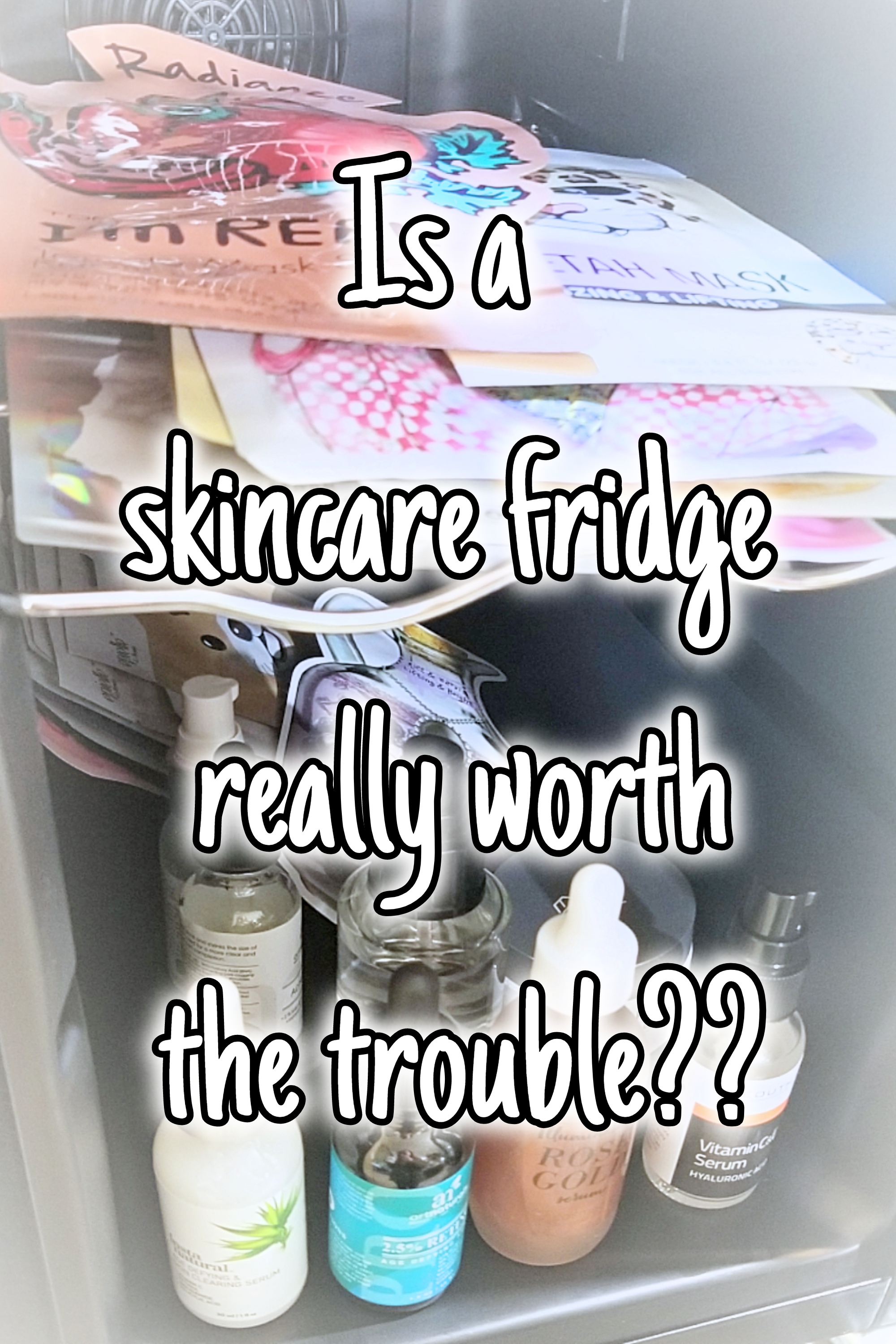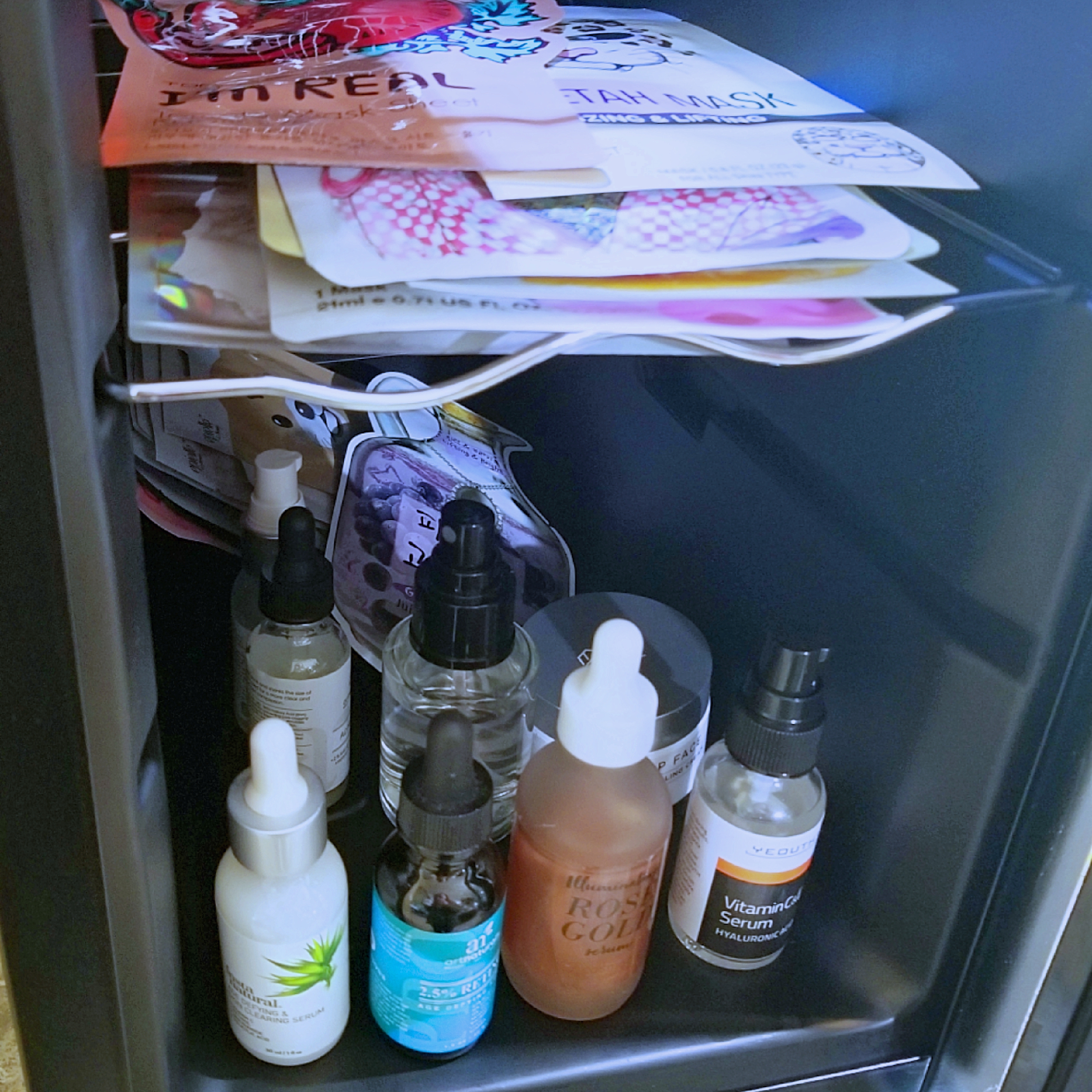
If you haven’t been living under a rock, you will have seen the skincare fridge trend that has swept through the online skincare community. But is a skincare fridge really worth the hassle?
According to skincare gurus singing the praises of skincare fridges; refrigerating your skincare products can increase their effectiveness. This can be true with some products, but not all!
This post contains affiliate links; if you snag a product through my link it will send some spare change my way to keep this slice of the internet up and running.

Does a Skincare Fridge Increase Product Effectiveness?
It will provide a pleasant cooling sensation with most products but usually won’t create long term benefits. But refrigeration is a great idea for some of your skincare!
“It does add an extra calming effect to face masks, moisturizers, and creams, which is especially helpful when treating irritated skin,” says Dr. Sobel. He recommends stashing face masks (“those with cooling ingredients, like mint, feel nice when cold”), eye cream (“it can minimize puffiness for under-eye bags”), and moisturizers in the fridge. Cold serums might also help calm inflamed acne bumps, he adds, as well as any formula that contains aloe; when cold, the ingredient can be incredibly soothing.
Howard Sobel, M.D., NYC located dermatologist
Chilling your skincare can help with preventing bacteria buildup. Pots of moisturizer can start growing bacteria after having fingertips dipped in over and over again especially since they are commonly stored on steamy bathroom counter-tops. Storing your facial cream or any other skincare packaged in a tub/pot in the fridge will prevent any bacteria from growing in your product.
In a 2017 interview with Allure Elizabeth Tanzi, a board-certified dermatologist also agrees that chilling eye products can reap extra benefits.
“The fact that it’s cold helps to vasoconstrict and may help with puffiness,” says Tanzi. “Otherwise, I don’t think there is much difference between room-temperature and cold products.”
Elizabeth Tanzi, board-certified dermatologist
The ingredients used in your products are important to consider, too, says Debra Jaliman, MD, another New York City dermatologist.
“Refrigerating products may help extend their shelf life,” she tells us. That includes vitamin C, retinol, and benzoyl peroxide formulas. These ingredients “should not be kept in warm environments,” Dr. Jaliman explains, and refrigerating them could keep them stable longer.
Debra Jaliman, MD, NYC based dermatologist
Which skincare ingredients actually benefit from being stored in the fridge?
Common skincare ingredients that would benefit from being kept in a skincare fridge include:
- Vitamin C
- Retinol, adapalene, and other retinoids
- AHAs like lactic or glycolic acid
- BHAs like salicylic acid and citric acid
Vitamin C and retinoids (vitamin A derivative serums) are sensitive to sunlight and temperature, they can break down and oxidize faster if not stored in a dark and cool location. That’s why vitamin C and retinoid serums are typically bottled in dark tinted glass.
Storing them in the fridge will boost their shelf life and ensure they don’t break down as quickly. I’ve made the mistake of leaving Vitamin C serums on a shelf exposed to sunlight; this active ingredient can quickly change color and develop a pungent scent when exposed to light and air. Don’t make the same mistake as me! AHA and BHA products are also sensitive and should be treated with the same level of care.
Here’s a general rule of thumb: if the product causes sun sensitivity it should be stored somewhere cool and dark. Therefore these products would highly benefit from being stored in a skincare fridge!
What types of skincare products should be kept room temperature?
Here are the skincare products that should not be refrigerated:
- Oils & formulas with high concentrations of oil
- Clay/mud masks
Oil and fat based products can become cloudy when chilled. Lower temps can cause the oil and water ingredients in the product to separate and become difficult to use. Clay face masks should also be left out of the fridge. Mud masks will become rock hard when refrigerated so make sure these don’t get mixed into your skincare fridge.
Can I just store skincare products in my normal fridge?
Don’t store delicate skincare formulas in your fridge. Have you ever accidentally frozen lettuce in the fridge by storing it in the wrong place? I’m not crying over $2 bucks lost over lettuce but we would have a serious problem if that was one of my top dollar serums. A product might accidentally freeze if left in the wrong spot in the fridge.
Mini fridges don’t get as cold as a full-fledged fridge and that is for the best! I’d hate to see something like a face mask in a foil pack freeze, that would not be a pretty sight!
Skincare fridge alternative?
Before I got my pastel retro skincare fridge from Walmart, I was determined to find a temporary alternative to safely refrigerate my skincare. These mini fridges can range from $50-150 so it took almost a year before I finally bought one. My husband and I were gifted a refrigerated wine cellar for Christmas but we rarely drink enough wine to warrant having an entire fridge dedicated to it.
I realized since the temperature on the wine cooler was programmable that I could tweak the temperature to create an instant skincare fridge!

